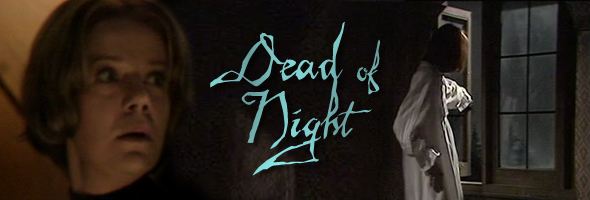
Color, 1970, 150m.
Directed by Don Taylor, Rodney Bennett and Paul Ciappessoni
Starring Anna Cropper, Clive Swift, Edward Petherbridge, Sylvia Kay, Peter Barkworth, Anna Massey, Ronald Hines
BFI (DVD) (UK R2 PAL)
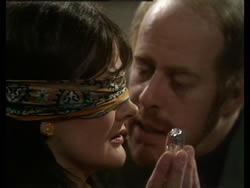 Originally broadcast on BBC2 as a seven-episode series in 1972, the British
Originally broadcast on BBC2 as a seven-episode series in 1972, the British 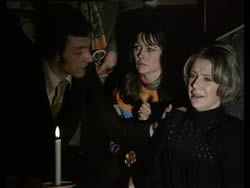 horror anthology Dead of Night has become a show far more often mentioned than seen due to the fact that over half of it was wiped out during the studio's tape purge. The remaining three tales have still been exceedingly difficult to see, which is odd considering its reputation -- particularly that of its premiere, often regarded as a high point of the decade's televised spooky output.
horror anthology Dead of Night has become a show far more often mentioned than seen due to the fact that over half of it was wiped out during the studio's tape purge. The remaining three tales have still been exceedingly difficult to see, which is odd considering its reputation -- particularly that of its premiere, often regarded as a high point of the decade's televised spooky output.
That episode in question is "The Exorcism," a ghost story with a hefty dose of nasty social commentary wedged into a four-character chamber drama. Affluent married couple Edmund (Petherbridge, a.k.a. TV sleuth Lord Peter Whimsy) and Rachel (Robin Redbreast's Cropper) have turned a country cottage into their perfectly appointed getaway spot, even inviting another couple, Dan (Swift) and Margaret (Kay), over for a Christmas dinner. At first the party games are slightly sadistic but generally innocent, such as the old "swipe an ice cube across a blindfolded person's face and tell them it's a razor" gag. However, things start to get very strange when two of them taste blood every time they drink wine, others see only pure darkness outside the windows, and everyone momentarily blacks out for no apparent reason. When Rachel starts to show signs of another personality invading her own, it's clear a maligned presence from the past is very unhappy with their presence in the house.
As much an actors' showcase as a solid ghost story, "The Exorcism" is exactly the kind of story that grabs critical attention as it offers some heady subtext to go along with its psychological chills. Cropper gets the richest material, obviously, including a lengthy climactic monologue that also works as sort of a ghostly mission statement, just before the story winds down on a particularly grim note. It isn't "scary" as much as it is incredibly uneasy, with the bourgeois unexpectedly confronted with a situation that feels like Luis Bunuel in a particularly sadistic mood. It would also play particularly well with another 2013 BFI release, Sleepwalker, which plays with some of the same social concerns embedded within a similarly horrific weekend for four people in the country.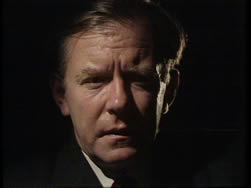
Up next is "Return Flight," a twist on the old haunted pilot chestnut that's popped in and out for decades. Here we have the story of Captain Hamish Rolph (Barkworth), whose wife has recently passed away. He's swiftly put away her belongings and tried to forget some of the less sunny aspects of their marriage, such as her first husband, an RAF pilot killed in World War II. After his latest flight involving a near miss with a craft no one else saw, it seems he may be haunted by his marital predecessor -- and when he gets scheduled for a flight to Hamburg, one of his coworkers starts to wonder whether something uncanny is at work, too.
Easily the most traditional of the trio (by modern standards at least), this one manages to goose up its fairly 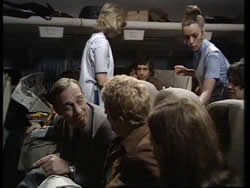 slim story with tons of atmosphere. At least half of the episode really feels like it's taking place in the middle of the night, creating a disorienting sense of dread even when people are sitting at desks looking manila folders. The theme of male insecurity also gives the supernatural angle an extra layer of ambiguity, with men constantly judging each other and trying to read motives and levels of ability at every turn, with Barkworth's solid performance keeping it all anchored dead center. (The hard-partying Germans passing out schnapps on the plane are welcome comic relief, too.)
slim story with tons of atmosphere. At least half of the episode really feels like it's taking place in the middle of the night, creating a disorienting sense of dread even when people are sitting at desks looking manila folders. The theme of male insecurity also gives the supernatural angle an extra layer of ambiguity, with men constantly judging each other and trying to read motives and levels of ability at every turn, with Barkworth's solid performance keeping it all anchored dead center. (The hard-partying Germans passing out schnapps on the plane are welcome comic relief, too.)
Finally we have "A Woman Sobbing," a spooky showcase for actress Anna Massey, who dabbled in horror before with Peeping Tom and Frenzy (and later in Vault of Horror and Haunted). Here she plays Jane Pullar, who's just moved into a new country house with her husband, Frank (Hines). In the middle of the night she hears a woman crying upstairs and smells gas fumes coming from the attic, though no evidence corroborates her story. She starts to lose her patience with their two children, feeling more agitated and tired as the disturbances continue. Wondering whether her husband is possibly trying to drive her off the deep end, she seeks help from a local priest and winds up undergoing extreme medical treatment, neither of which seem to address the real, dangerous force at work.
A very effective study in female madness (the force behind the excellent House of Psychotic Women), this will probably be the most effective episode for many viewers thanks to the ferocity of 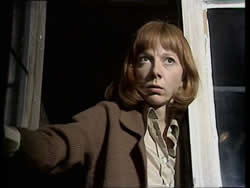 Massey's performance and the eerie nature of its narrative, which closes on a tantalizing note open to at least three different readings. As with the other two episodes, you feel sure early on that all will certainly not end well, and while it's common for English ghost stories to close out on a note of tragedy, the modern settings make it perhaps even more potent. Not surprisingly, this one was written by John Bowen, whose Robin Redbreast was released concurrently on DVD by the BFI (and whose "Test Card F" makes a return appearance here).
Massey's performance and the eerie nature of its narrative, which closes on a tantalizing note open to at least three different readings. As with the other two episodes, you feel sure early on that all will certainly not end well, and while it's common for English ghost stories to close out on a note of tragedy, the modern settings make it perhaps even more potent. Not surprisingly, this one was written by John Bowen, whose Robin Redbreast was released concurrently on DVD by the BFI (and whose "Test Card F" makes a return appearance here).
Considering this show has never had a home video release in any format, it's pleasing to see what survives of it existing in such good condition. The masters have been kept in good shape, and while "A Woman Sobbing" has an erratic appearance in its midsection due to different (inferior) equipment clearly being used for scenes away from the house, the transfers look very sharp and satisfying throughout. Optional English subtitles are also provided for the mono soundtracks. The only extra on the disc itself is a pair of galleries showing what survives of two other episodes, "Bedtime" and "Death Cancels All Debts." However, you'll find far more substantive information in the liner notes booklet containing essays by Lisa Kerrigan and bios of script editor Louis Marks, producer Innes Lloyd, Taylor, Bowen, and Robert Colin Holmes. Among the great facts here are the tidbit that Nigel Kneale's spectacular The Stone Tape originated as an episode of this series but instead evolved into a longer, separate production using the same crew. And if you pop the disc in your laptop, you can download pdfs of the missing scripts in their entirety as pdfs. (Really, check out "Bedtime." It's insane.) Perfect viewing for a cold, late autumn night.
Reviewed on October 13, 2013.


 Originally broadcast on BBC2 as a seven-episode series in 1972, the British
Originally broadcast on BBC2 as a seven-episode series in 1972, the British  horror anthology Dead of Night has become a show far more often mentioned than seen due to the fact that over half of it was wiped out during the studio's tape purge. The remaining three tales have still been exceedingly difficult to see, which is odd considering its reputation -- particularly that of its premiere, often regarded as a high point of the decade's televised spooky output.
horror anthology Dead of Night has become a show far more often mentioned than seen due to the fact that over half of it was wiped out during the studio's tape purge. The remaining three tales have still been exceedingly difficult to see, which is odd considering its reputation -- particularly that of its premiere, often regarded as a high point of the decade's televised spooky output. 
 slim story with tons of atmosphere. At least half of the episode really feels like it's taking place in the middle of the night, creating a disorienting sense of dread even when people are sitting at desks looking manila folders. The theme of male insecurity also gives the supernatural angle an extra layer of ambiguity, with men constantly judging each other and trying to read motives and levels of ability at every turn, with Barkworth's solid performance keeping it all anchored dead center. (The hard-partying Germans passing out schnapps on the plane are welcome comic relief, too.)
slim story with tons of atmosphere. At least half of the episode really feels like it's taking place in the middle of the night, creating a disorienting sense of dread even when people are sitting at desks looking manila folders. The theme of male insecurity also gives the supernatural angle an extra layer of ambiguity, with men constantly judging each other and trying to read motives and levels of ability at every turn, with Barkworth's solid performance keeping it all anchored dead center. (The hard-partying Germans passing out schnapps on the plane are welcome comic relief, too.)  Massey's performance and the eerie nature of its narrative, which closes on a tantalizing note open to at least three different readings. As with the other two episodes, you feel sure early on that all will certainly not end well, and while it's common for English ghost stories to close out on a note of tragedy, the modern settings make it perhaps even more potent. Not surprisingly, this one was written by John Bowen, whose Robin Redbreast was released concurrently on DVD by the BFI (and whose "Test Card F" makes a return appearance here).
Massey's performance and the eerie nature of its narrative, which closes on a tantalizing note open to at least three different readings. As with the other two episodes, you feel sure early on that all will certainly not end well, and while it's common for English ghost stories to close out on a note of tragedy, the modern settings make it perhaps even more potent. Not surprisingly, this one was written by John Bowen, whose Robin Redbreast was released concurrently on DVD by the BFI (and whose "Test Card F" makes a return appearance here).